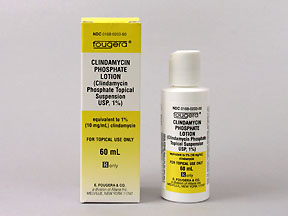
Cleocin-t Coupons & Savings Card – Discount Prices from $24.54
Brand for: Clindamycin phosphate
My prescription
Edit
60ML of 1%, Clindamycin Phosphate (1 Bottle)
Select pharmacy

CVS
$25.76
COUPON PRICE
Walgreens
$24.54
COUPON PRICE
Walmart
$25.44
COUPON PRICE
Albertsons
$26.62
COUPON PRICECleocin-t savings card
Show this card to your pharmacist
Walgreens
$24.54
BIN
ID
PCN
GRP
019876
LHA739765B
CHIPPO
LHX
Powered by
More prescriptions for upper respiratory infection
More prescriptions for upper respiratory infection
Cleocin-t (Clindamycin Phosphate) dosage forms
Dosage Quantity Price from Per unit 60ML 1 Bottle $24.54 $24.54 60ML 2 Bottles $33.22 $16.61 60ML 3 Bottles $48.67 $16.22 60ML 4 Bottles $56.13 $14.03 60ML 6 Bottles $71.05 $11.84
| Dosage | Quantity | Price from | Per unit |
|---|---|---|---|
| 60ML | 1 Bottle | $24.54 | $24.54 |
| 60ML | 2 Bottles | $33.22 | $16.61 |
| 60ML | 3 Bottles | $48.67 | $16.22 |
| 60ML | 4 Bottles | $56.13 | $14.03 |
| 60ML | 6 Bottles | $71.05 | $11.84 |
What is Cleocin T used for?
Cleocin T is used for the topical treatment of acne. It contains clindamycin, an antibiotic that helps reduce the number of acne-causing bacteria and decreases inflammation.
Is Cleocin T over the counter?
Cleocin T is not available over the counter. It requires a prescription from a healthcare provider.
Do you need a prescription for Cleocin T?
Yes, Cleocin T requires a prescription from a healthcare provider.
What skin conditions does clindamycin treat?
Clindamycin is commonly used to treat bacterial skin infections, including acne vulgaris. It is effective against certain types of bacteria that contribute to these conditions.
What to avoid when using clindamycin gel?
When using clindamycin gel, one should avoid applying it to broken or irritated skin, as well as near the eyes, mouth, or mucous membranes. It is also advisable to avoid using other topical acne treatments simultaneously unless directed by a healthcare provider, as this may increase skin irritation. Additionally, exposure to sunlight or tanning beds should be minimized, as clindamycin can make the skin more sensitive to UV rays.
